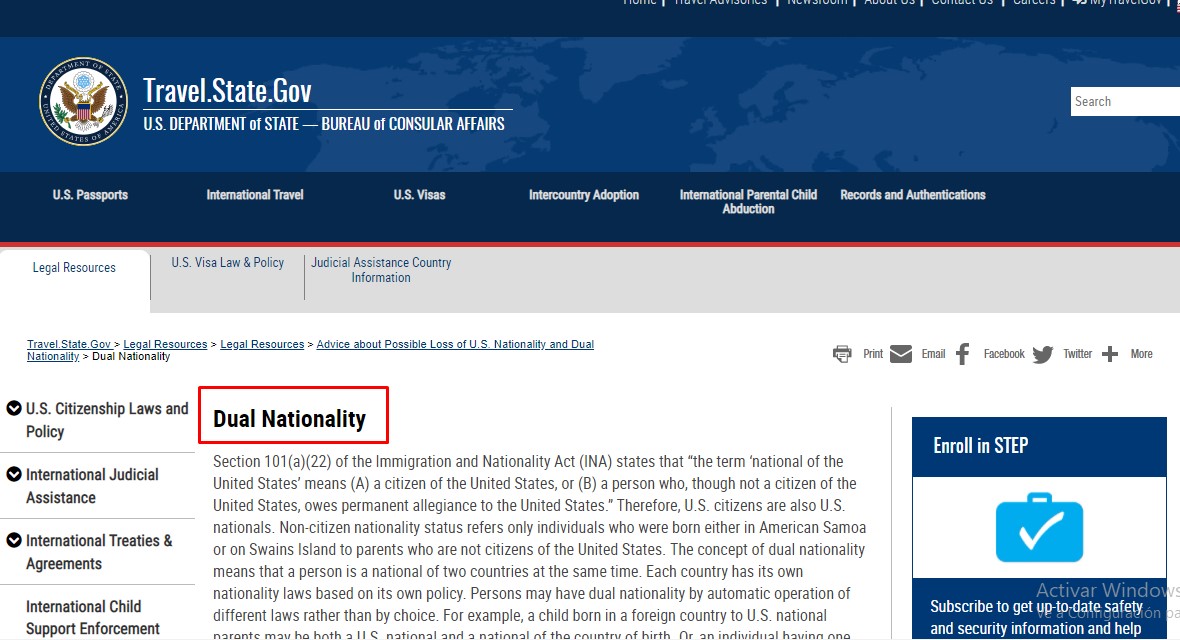Dual citizenship means that a person can be a citizen of two countries at the same time. In the case of the United States, this option is available but there are some conditions that you must fulfill.
When you are born in the territory of the United States, you are automatically an American according to the 14th amendment of the Constitution; this still applies even if the newborn’s parents are foreigners and non-residents, and even if they do not have legal status.
Foreigners legally residing in the country can also acquire United States citizenship. The process is known as naturalization and gives the immigrant the same rights as citizens by birth. If you are interested in knowing more about it, keep reading.
Apply for American citizenship
To apply for the American nationality, you must complete the following requirements:
- Be 18 years of age, verified with a birth certificate.
- Be the holder of a valid Green Card for 5 years before the application date.
- Have been physically present in the United States for at least 30 months of the 5 years immediately preceding the date of the application.
- Reside in the same state or district valid for the Citizenship and Immigration Service, for at least 3 months before applying for citizenship.
- It is essential not to have a criminal record or have been arrested for alcoholism, drugs, or any type of violence.
- Reside continuously in the United States from the date of application for naturalization until the date of obtaining citizenship.
- Know the civic principles and institutions of the nation.
- Pass the United States Citizenship Test.
- Have a favorable disposition towards the United States.
- Demonstrate the ability to read, write, and speak in English, during a personal interview.
Spouses of a US citizen can also get the naturalization.

➡ READ ALSO: Florida residency requirements
To apply for citizenship, the interested party must fill out Form N-400, and send it to the United States Citizenship and Immigration Service.
This request must go along with the required personal documents and the corresponding payment for administrative expenses.
For more related information you can enter here: https://www.uscis.gov/n-400.
Citizenship test or exam
All applicants must take a country and English language knowledge test to obtain citizenship. This exam is done during a personal interview with a Citizenship and Immigration Services (USCIS) official after you pass the application process.

The exam consists of a 100-question test on civics, history, and the government system of the United States. A USCIS officer asks the applicant 10 questions orally, chosen randomly, from a list of 100.
The applicant passes if he answers correctly at least 6questions. During the exam, the immigration officer will also measure the applicant’s English language skills, the ability to understand questions, and the capability to communicate ideas.
The English test has three components:
- Reading.
- Writing.
- Speaking.
Besides, the official will ask about the personal aspects of the applicant, specifically about the data provided in the application.
The applicant will have two opportunities to pass the exam for the English or civics parts. If you do not answer a question satisfactorily in your initial interview, you will be able to retake the test in the same part of the exam that you failed. This new opportunity will only be available 60-90 days after the initial interview date.
Disadvantages of a dual citizenship
One of the disadvantages of dual citizenship is double taxation, which is the obligation to pay taxes in the two countries of which one is a citizen. The United States imposes the obligation to pay tax returns annually even if you reside outside the country.
Another disadvantage is the inability to access certain types of jobs. In the United States, many jobs in private companies, the government, or certain positions within the Army require a security clearance.
In most cases, having dual citizenship alone will not deny you a security clearance. However, it is relatively common under the following circumstances:
- Use of another passport, unless it is before the acquisition of American nationality.
- Perform military service in another country, unless it occurred before becoming an American.
- Accept medical, retirement, educational, or similar benefits from the other country of which you are also national.
- Use the other citizenship to protect your economic or business interests in another country.
- Participate as a candidate in the elections of another country.
- Holding a public office in another country (this is the most common reason for renouncing American nationality).
- Vote in elections in another country (only in very rare and extreme situations).
- Act on behalf of another government and defend its interests.

